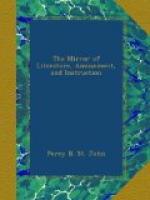* * * * *
SPIRIT OF DISCOVERY
* * * * *
IRIS LUNARIS.
That rare and beautiful phenomenon the Iris Lunaris, or moonlight rainbow, was observed by Mr. W. Colbourne, jun. and a friend of his, from an eminence about a quarter of a mile from Sturminster, on the evening of the 14th instant, about twenty minutes before nine o’clock, in the north-west. Its northern limb first made its appearance; but after a few minutes, the complete curvature was distinctly and beautifully displayed. The altitude of its apex seemed to be nearly forty degrees. Nothing could exceed the beauty of the appearance of this arch of milky whiteness, contrasted as it was with the sable rain fraught clouds which formed the background to this interesting picture. It continued visible more than five minutes, and gradually disappeared at the western limb.
RURIS.
Sturminster.
WESTPHALIA HAMS
Are prepared in November and March. The Germans place them in deep tubs, which they cover with layers of salt and saltpetre, and with a few laurel leaves. They are left four or five days in this state, and are then completely covered with strong brine. At the end of three weeks they are taken out, and left to soak for twelve hours in clear well-water; they are then exposed, during three weeks, to a smoke produced by the branches of juniper.—From the French.
LONDON PORTER.
The bitter contained in porter, if taken wholly from hops, would require an average quantity of ten or twelve pounds to the quarter of malt, or about three pounds per barrel; so that if we consider the fluctuation in the price of hops, we shall not be surprised at the numerous substitutes, by which means the brewer can procure as much bitter for sixpence as would otherwise cost him a pound.
Quassia is, probably, the most harmless of all the illegal bitters. The physicians prescribe the decoction to their patients to the extent of a quarter of an ounce of the bark a day—as much as the brewer was accustomed to put into nine gallons of his porter.—Library of Useful Knowledge.




